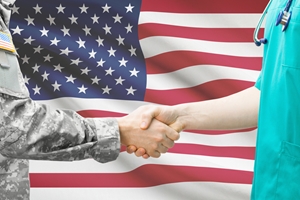An understanding of military culture is essential for health care systems and providers to effectively care for veterans and their families, a new University at Buffalo study found.
According to the UB Reporter, the university's official newspaper, the study – first published in the journal Military Behavioral Health – suggested that both health and mental health care providers should be given training that would provide them with a basic understanding of military values and belief systems. Just as important, this training would shed light on how veterans personally transition into their life after service.
The University at Buffalo's study is one of the very first to discuss how health care professionals must address the unique challenges facing military families, from deployment difficulties to those obstacles faced after a discharge, when veterans must look for civilian employment.
"The military is a unique institution, with its own structure, terminology, and culture, and military service is often a profound experience that changes the servicemember's identity, and his/her assumptions and expectations about the world," Lisa Butler, an associate professor in the university's School of Social Work and an author of the paper, told HealthCareBusiness News.
"All these factors can present challenges to providers and systems of care if they don't ask about a military service history and don't know how to incorporate that information into the care they provide," Butler continued.
Four different focus groups – two male veterans groups, one female group and one group of military family members – were asked by researchers to explain their health care experiences in depth, with particular emphasis given to those areas perceived to be lacking.
"Just as you want to be culturally competent working with any population, with veterans it is particularly important because they may shut you out if they suspect a lack of understanding. They'll walk away," Butler told the UB Reporter. "Providers who bring military/veteran cultural competence to their interactions with veterans have the potential to enhance outcomes and increase quality of care."

